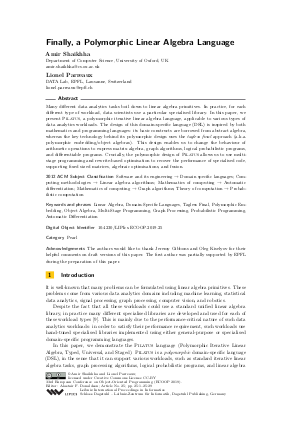@InProceedings{shaikhha_et_al:LIPIcs.ECOOP.2019.25,
author = {Shaikhha, Amir and Parreaux, Lionel},
title = {{Finally, a Polymorphic Linear Algebra Language}},
booktitle = {33rd European Conference on Object-Oriented Programming (ECOOP 2019)},
pages = {25:1--25:29},
series = {Leibniz International Proceedings in Informatics (LIPIcs)},
ISBN = {978-3-95977-111-5},
ISSN = {1868-8969},
year = {2019},
volume = {134},
editor = {Donaldson, Alastair F.},
publisher = {Schloss Dagstuhl -- Leibniz-Zentrum f{\"u}r Informatik},
address = {Dagstuhl, Germany},
URL = {https://drops.dagstuhl.de/entities/document/10.4230/LIPIcs.ECOOP.2019.25},
URN = {urn:nbn:de:0030-drops-108172},
doi = {10.4230/LIPIcs.ECOOP.2019.25},
annote = {Keywords: Linear Algebra, Domain-Specific Languages, Tagless Final, Polymorphic Embedding, Object Algebra, Multi-Stage Programming, Graph Processing, Probabilistic Programming, Automatic Differentiation}
}

 Creative Commons Attribution 3.0 Unported license
Creative Commons Attribution 3.0 Unported license



































































